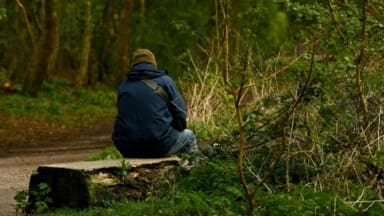
Studies show that gardening and time in nature can have a significant role in keeping people emotionally, psychologically and physically healthy. By means of the Plants not Pressure campaign, Thrive, the national charity that promotes gardening for health and wellbeing, is encouraging men into gardening and spending time in nature for the significant benefits on physical and mental health.
According to Mind, 1 in 4 people will experience a mental health problem of some kind each year in England. While poor mental health can affect people of any gender, there are some differences between men and women. In 2022, around three-quarters of suicides were by males. While finding generalised reasons is difficult, it is suggested traditional expectations of masculinity, being less willing or able to talk about mental health challenges, work and financial pressures are all potential contributing causes. NHS referrals for psychological therapies are also skewed, with only 36% for men.
Highlighting this issue, the ‘Plants not pressure’ campaign features stories from men who have benefitted from time in the garden including; Mark Lane, Thrive’s Ambassador, gardener, author and TV presenter, speaks of his mental health challenges and how gardening helped his recovery following an accident, and Jason Williams, garden designer and Thrive ambassador, who lives with anxiety and depression and tells how gardening supports his mental health.
Mark Lane said: “Studies show that gardening-based interventions for people experiencing mental health problems can lead to a reduction in the symptoms of depression, stress and anxiety, and an increase in self-esteem and better mood. It’s been well documented that gardening can improve alertness and social skills as well as reduce reliance on medications and self-harming behaviour.”
A dedicated survey entitled ‘Gardening and Men’, was also conducted by Thrive amongst 117 male respondents to further understand their relationship with gardens. The survey results indicated that 91% of respondents think gardening helps boost their mood and 87% said gardening helps improve their physical fitness.
Horticulturist, garden writer and broadcaster, Monty Don OBE VMH told Thrive: “I garden because I love the process and the result. It is an endless source of fascination and pleasure. But I also garden because it returns me to myself. It sets the world and I straight when things have gone awry. Being outside, being aware of weather and season, nurturing living plants and investing in a growing future is a powerful source of hope – and with hope, anything is possible.
The mental and physical benefits of gardens and Green Care interventions are highlighted in the Mental Health Foundation report on Mental Health and Nature. Gardening was included in the ‘Be active’ advice in The Five Ways to Wellbeing evidence-based public mental health message developed by the New Economics Foundation. The NHS now also (green) prescribing of Social and Therapeutic Horticulture (STH) to improve health.
